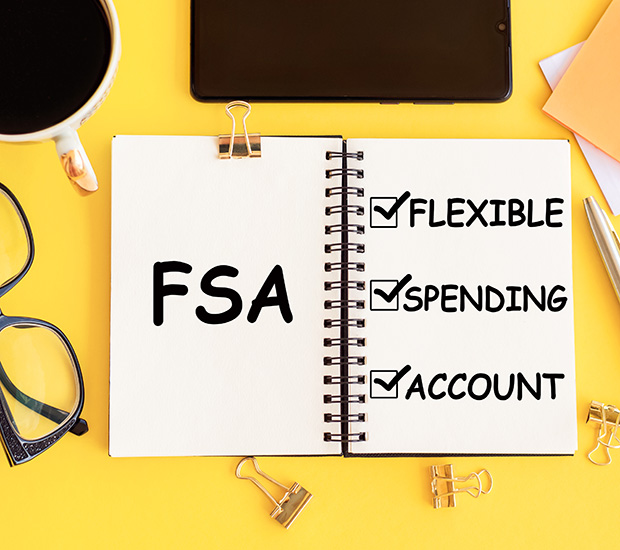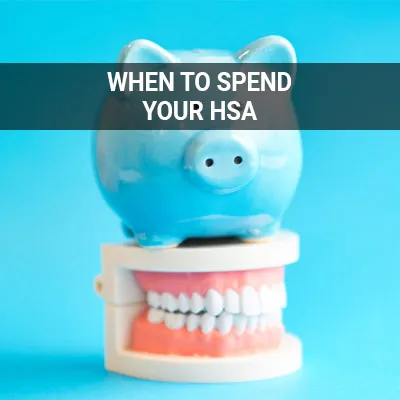Flexible Spending Accounts Los Angeles, CA
Flexible spending accounts or flexible spending arrangements, also known as FSAs, are a type of savings account offered to employees by their employers. Employees can contribute a portion of their regular earnings, or employers can contribute to the employees' accounts. The employee must use these contributions for reimbursement for qualifying expenses related to dental and medical services.
At Dr. Robert B Tamaki, DDS, we are proud to serve patients in Los Angeles and the surrounding area. We accept FSAs and dental insurance. Call us today at (310) 402-0156 to schedule an appointment or learn more about our services.
How FSAs Work
FSAs can help bridge the gap left by other health insurance plans. They allow employees to use tax-free funds to cover out-of-pocket health care expenses, and they sometimes replace a traditional employer health insurance plan.
Employees can also use their FSA to supplement a marketplace plan. In other cases, the FSA may supplement an employer-sponsored health care plan. Either way, the FSA has one central purpose: to cover out-of-pocket expenses.
Employees contribute a limited amount of money to their FSA each year. These funds are taken out of the paycheck before taxable income is calculated. Afterward, employees have one year to use their funds on approved health care expenses. FSA funds can apply toward deductibles, copayments, and coinsurance. Some prescription drugs and over-the-counter medications are covered. Employees can even pay for medical devices like crutches using their FSA.
“FSA can help bridge the gap left by other health insurance plans.”
Pros and Cons of an FSA
The primary advantage of an FSA is tax savings. FSA funds are deducted before taxes, thus lowering an employee's overall taxable income. As a result, some actually find that an FSA increases their take-home pay. Additionally, FSA funds are always available and can even be linked to a debit card for extra convenience. FSAs also do not require pre-approval or additional paperwork.
Still, FSAs also come with their own set of disadvantages. For one thing, there is a limit to the amount of money that employees can contribute per year. For another, FSA funds are intrinsically linked to an employer – meaning employees cannot keep their current FSA if they change jobs.
“The primary advantage of an FSA is tax savings.”
How to Save Money With an FSA
With an FSA, employees can set aside money from their paycheck. Enrollment is available for a limited time at most workplaces. One's employer can provide more details about where, when, and how to sign up for an FSA.
During the enrollment period, employees determine how much money they plan to save. Choosing the FSA budget can be tricky. If an employee underestimates how much money they need, they might lose out on tax savings. If they overestimate, they may lose the money. The exact amount one needs will depend on their family's unique circumstances.
After enrollment, the money is deducted from each paycheck. Employees have until March 15 of the following year to use their funds. Keep in mind that unused funds will expire. It's the employee's responsibility to use their funds before the deadline.
“One’s employer can provide more details about where, when, and how to sign up for an FSA.”
Check out what others are saying about our dental services on Yelp: Flexible Spending Accounts in Los Angeles, CA
FSAs and Dental Treatments
In addition to covering standard healthcare expenses, FSAs can cover the costs of preventative dental care. They may cover both deductibles and copayments. However, it is essential to note that FSAs do not cover all types of dental procedures. In particular, no cosmetic dental procedures are covered by an FSA.
However, exceptions may apply for medically necessary orthodontics. Since there is no specific set of rules that defines what procedures qualify for coverage under an FSA, patients should overview the details of their plan with their orthodontist before beginning treatment.
“In addition to covering standard healthcare expenses, FSAs can cover the costs of preventative dental care.”
Questions Answered on This Page
Q. How do I sign up for an FSA?
Q. What are some of the pros and cons of an FSA?
Q. Do FSAs cover dental treatments?
Q. What is covered under an FSA?
People Also Ask
Q. Is dental insurance worth it?
Q. Who is the billing specialist?
Q. How often should someone have a dental checkup?
Q. Do HSAs cover dental services?
Q. How can I find dental insurance that takes my ideal dentist?
Q. What is the importance of having a routine dental checkup?
Q. How can someone determine what type of dentist or service they need?
Treatments Covered by an FSA
FSAs cover most preventative and diagnostic procedures, along with certain medical devices. However, some exceptions may apply. FSAs are commonly used for things like:
- Coinsurance
- Copays
- Deductibles
- Eye surgery
- Eyeglasses
- Hearing aids
- Hospital expenses
They also cover several kinds of dental services, such as:
- Crowns, bridges, and dentures
- Diagnostic and preventive care
- Filling, sealants, and extractions
- Gum disease treatment
- Oral surgery
- Routine cleanings
Employees should contact their employer and plan provider with any questions and concerns they have about rules and exemptions regarding their FSA. They will also need to find out what is not covered under their plan.
“Employees should contact their employer and plan provider with any questions and concerns they have about rules and exemptions regarding their FSA.”
Frequently Asked Questions
Q. What is the maximum amount I can put in my flexible spending account?
A. While maximum annual contributions may vary, the most you can put into a medical FSA is $2,750. The yearly maximum for a dependent care FSA is $5,000. Ask your employer for more details about your policy.
Q. Do my FSA funds roll over?
A. It depends on your employer. If you have money left in your flexible spending account at the end of the year, your employer may give you 2.5 more months to spend the money. They may also allow you to carry over up to $500 for the next plan year.
Q. What is the difference between a medical FSA and a dependent care FSA?
A. As the names suggest, medical FSAs are reserved for medical expenses only. Dependent care FSAs are reserved for dependent care services. The latter include before or after-school programs, child or adult daycare, preschool, and summer day camp.
Q. What is the difference between an FSA and an HSA?
A. Flexible spending accounts (FSAs) are owned by an employer. Health savings accounts (HSAs) are controlled by an individual. However, both allow employees to save on their medical expenses with pre-tax money.
Q. Are FSAs the same as HRAs?
A. No. Flexible spending accounts (FSAs) are funded by the employee and sometimes by the employer. In contrast, HRAs are funded only by the employer. However, patients can have both accounts at once.
Dental Terminology
Call Us Today
An FSA can help you set aside health care funds and save money at tax time. If your health care plan doesn't cover out-of-pocket dental expenses, an FSA might be able to help. But it's your job to make sure that your funds don't expire. If you don't use your FSA funds each year, you may forfeit the money.
Let Dr. Robert B Tamaki, DDS in Los Angeles help you put your FSA to use. Call us at 310-402-0156 to learn more about applying FSA funds toward dental care.
Helpful Related Links
- American Dental Association (ADA). Glossary of Dental Clinical Terms. 2024
- American Academy of Cosmetic Dentistry® (AACD). Home Page. 2024
- WebMD. WebMD’s Oral Care Guide. 2024
About our business, license, and website security
- Dr. Robert B Tamaki, DDS was established in 1985.
- We accept the following payment methods: Cash, CareCredit, Check, MasterCard, and Visa
- We serve patients from the following counties: Los Angeles County
- We serve patients from the following cities: Los Angeles, Santa Monica, Venice, Marina Del Rey, Redondo Beach, Hermosa Beach, Manhattan Beach, and Westchester
- CA (License #DDO-33386). View License Information and Specifics
- National Provider Identifier Database (1568559011). View NPI Registry Information
- Healthgrades. View Background Information and Reviews
- Norton Safe Web. View Details
- Trend Micro Site Safety Center. View Details
Back to top of Flexible Spending Accounts










